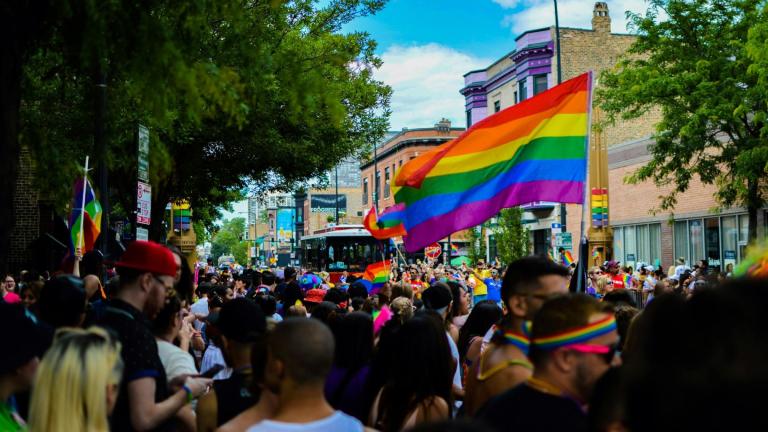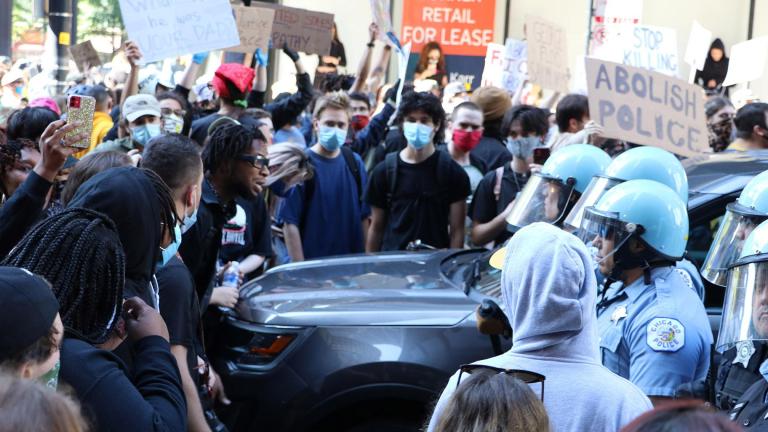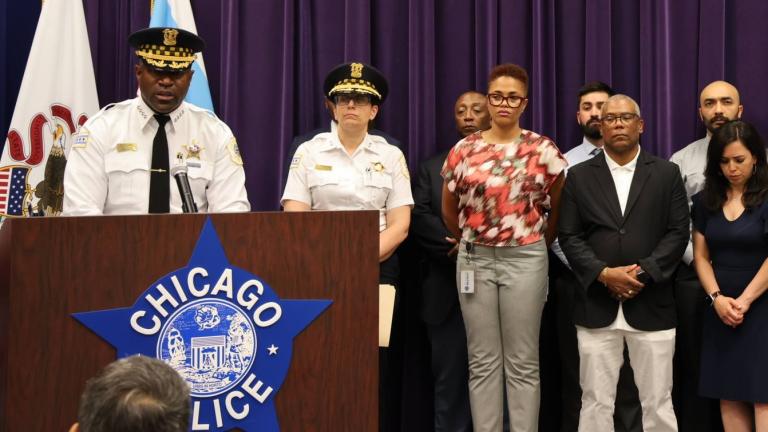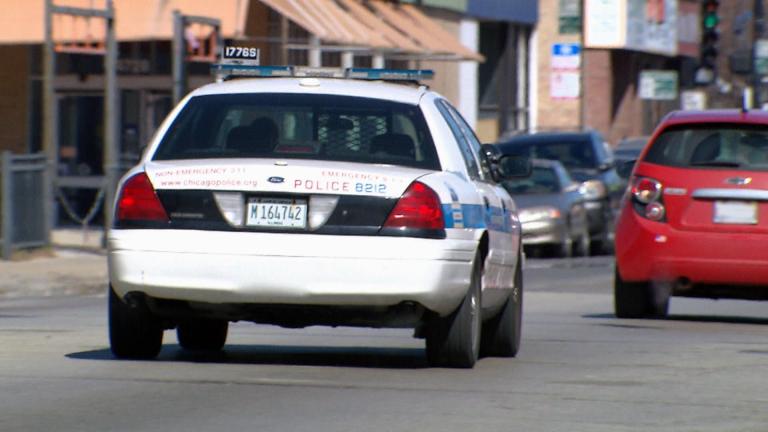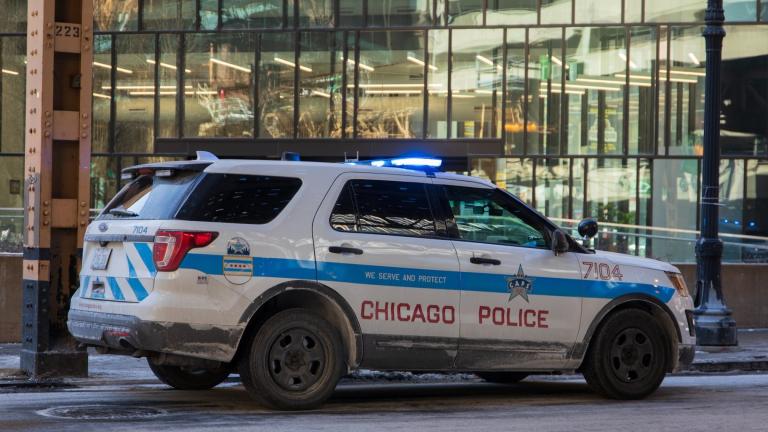Video: Ald. David Moore (17th Ward) and Ald. Byron Sigcho-Lopez (25th Ward) join “Chicago Tonight” on May 20, 2024, to discuss the ShotSpotter contract. (Produced by Emily Soto)
The debate that has raged for months over whether ShotSpotter is an irreplaceable tool in the fight against gun violence on Chicago’s West and South sides or a waste of taxpayer funds that actually makes Black and Latino Chicagoans less safe is set to reach a crescendo Wednesday.
Ald. David Moore (17th Ward) told WTTW News Friday he will force a vote on an order that accuses Mayor Brandon Johnson of having “usurped the will of the City Council and their ability to represent constituents” by canceling the city’s contract with SoundThinking, which operates the ShotSpotter gunshot detection system.
During the 2023 campaign for mayor, Johnson vowed to terminate the city’s use of the system, saying there was “clear evidence (ShotSpotter) is unreliable and overly susceptible to human error.” He blamed the system for the death of 13-year-old Adam Toledo, who was shot and killed by a Chicago police officer responding to an alert from the system in March 2021.
However, Moore said he was certain that gun violence would spiral out of control if the Chicago Police Department stops using ShotSpotter.
“This is a prevention thing,” Moore said. “Shootings are going to increase if CPD can’t use this system.”
Homicides dropped 15% and shootings declined approximately 7% during Johnson’s first year in office, as compared with the previous year, according to city data.
ShotSpotter has been in use in Chicago since 2017, when it was launched by former Mayor Rahm Emanuel. During 2020 and 2021, years defined by the COVID-19 pandemic, crime and violence surged to record highs and has yet to full recede.
Inspector General Deborah Witzburg released an audit in August 2021 that found that fewer than one in 10 ShotSpotter alerts resulted in evidence of a gun-related criminal offense being found.
Cook County State’s Attorney Kim Foxx released a report in February that found the system rarely led to prosecutions for gun crimes.
The dispute over ShotSpotter is one of a number of issues that have exposed tension between two critical parts of Johnson’s political base: progressive Chicagoans who want to see the system scrapped and Black Chicagoans demanding city officials do everything possible to reduce persistent levels of violence.
The company that owns ShotSpotter has long defended the system — which does not operate downtown or on the North Side — as an important part of a multipronged approach to law enforcement and touted its ability to speed help to those wounded by gunfire. A spokesperson for SoundThinking CEO Ralph Clark declined to make him available for an interview with WTTW News.
“Every citizen of Chicago deserves a swift response if they are a victim of gun violence,” SoundThinking Vice President Gary Bunyard said in a statement. “Yet, the majority of gunfire goes unreported to 911. ShotSpotter fills that gap. And, by doing so, ShotSpotter helps save lives. ShotSpotter identifies the precise location of a gunfire incident in less than 60 seconds, allowing first responders to render swift aid to victims – victims who might otherwise never see a first responder.”
U.S. Sens. Elizabeth Warren and Edward Markey and U.S. Rep. Ayanna Pressley, who are all Democrats from Massachusetts, called Tuesday for federal officials to investigate whether the use of ShotSpotter may lead to civil rights violations.
A company spokesperson called the call for a federal investigation a “baseless attempt to disparage this critical public safety technology. ShotSpotter saves lives in the places hit hardest by gun violence.”
The company launched a media blitz in the weeks leading up to Wednesday’s Chicago City Council vote, which could be decisive for the company’s future, which rebranded after Johnson’s election. Earlier this month, Clark presented a $10,000 check to the Chicago Police Foundation’s Ella French Scholarship fund.
On the day Johnson announced he would cancel the company’s contract with the city, the firm’s stock dropped more than 18%, records show. The firm has lost 40% of its value as measured by the stock market in the past year to close at $14.35 per share on Friday.
In an interview with Politico Illinois to highlight his contribution to the scholarship fund honoring French, a Chicago police officer killed in the line of duty, Clark acknowledged that Johnson pledged to end the use of ShotSpotter during the campaign but likened that promise to former President Barack Obama’s vow to close the detention camp on Guantanamo Bay and suggested Obama had reversed course.
However, Obama never wavered in his push to close the prison designed to hold suspected terrorists in the wake of the Sept. 11 attacks, which was blocked by Republicans in Congress.
Strategia Consulting CEO Lissa Druss, whose firm is registered to lobby city officials on behalf of SoundThinking, told WTTW News a “grassroots” movement had emerged in Chicago to urge city officials to keep the gunshot detection system and offered the saveshotspotter.com website as evidence.
That website, which touts the system as a “lifeline for Chicago,” identifies its creator as SoundThinking.
Druss declined to answer questions about why a company-created website was presented as evidence of a “grassroots” movement.
Druss helped write the order sponsored by Moore, according to the Chicago Reader.
Bunyard did not answer questions about why the site features a video from former Chicago Police Supt. Eddie Johnson driving through city streets extoling ShotSpotter’s virtues after he was terminated for lying about driving while intoxicated.
Eddie Johnson was fired by former Mayor Lori Lightfoot after he apparently passed out in his running car at a stop sign in Bridgeport for nearly two hours after consuming “several large servings of rum” at a bar in the Loop in October 2019, an investigation by the city’s watchdog concluded.
“Eddie Johnson cares about every man and woman inside CPD and cares about keeping every Chicago citizen safe,” Bunyard said. “CPD started using ShotSpotter when he was superintendent and he knows the system very well. Eddie is passionate about how it helps save lives, and so are we.”
The measure calls for a City Council vote before the ShotSpotter system is removed from any city ward, even though the Chicago Police Department divides the city into police districts, some of which comprise several wards.
Brandon Johnson has called the order unworkable and unlawful and has repeatedly told reporters that he will not reverse his decision to end the city’s use of the system after a transition period that ends Nov. 22.
The measure needs 26 votes to pass the City Council, and would be subject to a mayoral veto.
The mayor’s decision to wind down and then end Chicago’s use of ShotSpotter came over the objection of Chicago Police Supt. Larry Snelling, who vowed to continue supporting any technology designed to help officers get to crime scenes faster.
Even though the mayor has given no sign he will reconsider his decision about ShotSpotter, Snelling has frequently told reporters and alderpeople the system is “truly important,” fueling efforts led by Black alderpeople who represent the South and West side to override its cancelation.
“It has allowed us to get to jobs quicker,” Snelling said during a May 1 City Council meeting, adding that it has helped police officers “save lives.”
It is highly unusual for the city’s top cop to have such a sustained high-profile public disagreement with the mayor who appointed him and has the power to terminate him for any reason.
Many Black alderpeople have pleaded with the mayor to reverse course, saying the system would be worthwhile if it saves even only one life.
The extension of Chicago’s contract with ShotSpotter until November will allow police brass to “revamp operations within the Strategic Decision Support Centers, implement new training and further develop response models to gun violence that ultimately reduce shootings and increase accountability,” according to the mayor’s office.
That contract extension cost Chicago taxpayers an additional $4.2 million, according to city records.
By comparison, Chicago’s 2024 spending plan calls for the city to spend an additional $4.8 million on mental health services than it did the previous year, as part of the proposal known as Treatment Not Trauma, which Brandon Johnson pledged to implement if elected mayor.
Moore’s order would require the Johnson administration to provide alderpeople with a host of data generated by the ShotSpotter system before the city’s contract with SoundThinking expires on Nov. 22.
After the City Council’s Police and Fire Committee unanimously advanced the measure sponsored by Moore, CPD officials sent a 14-page report to alderpeople that appeared to show police response times were more than two minutes quicker with a ShotSpotter alert than when the gunshot detection alert was accompanied by a 911 call, as first reported by the Chicago Sun-Times.
However, that data appears to be riddled with errors, as first reported by South Side Weekly. In addition, the People’s Fabric, an anonymous blog that typically focuses on Far Northwest Side politics, was the first to report that the data sent to alderpeople left out a full year’s worth of information and relies on data entered by officers about when they reached a crime scene.
The data used by CPD to compile the report sent to alderpeople also includes calls with negative response times and identifies more than 12,000 calls, or about 7% of the total, that were responded to in zero seconds, as first reported by the People’s Fabric.
Bunyard did not respond to questions about the apparent errors in the data. Druss said SoundThinking was not aware of the apparent errors until WTTW News asked about them.
SoundThinking “supports efforts to establish an open and transparent data-driven process so that all parties can make a fully informed decision,” Bunyard said.
Chicago police did not track how long it takes them to respond to half of all 911 calls between 2017 and 2021, making it impossible for the city’s inspector general to assess whether it takes officers longer to respond to calls for help coming from Black and Latino neighborhoods, according to a September 2023 audit.
Contact Heather Cherone: @HeatherCherone | (773) 569-1863 | [email protected]
A Safer City is supported, in part, by the Sue Ling Gin Foundation Initiative for Reducing Violence in Chicago.

